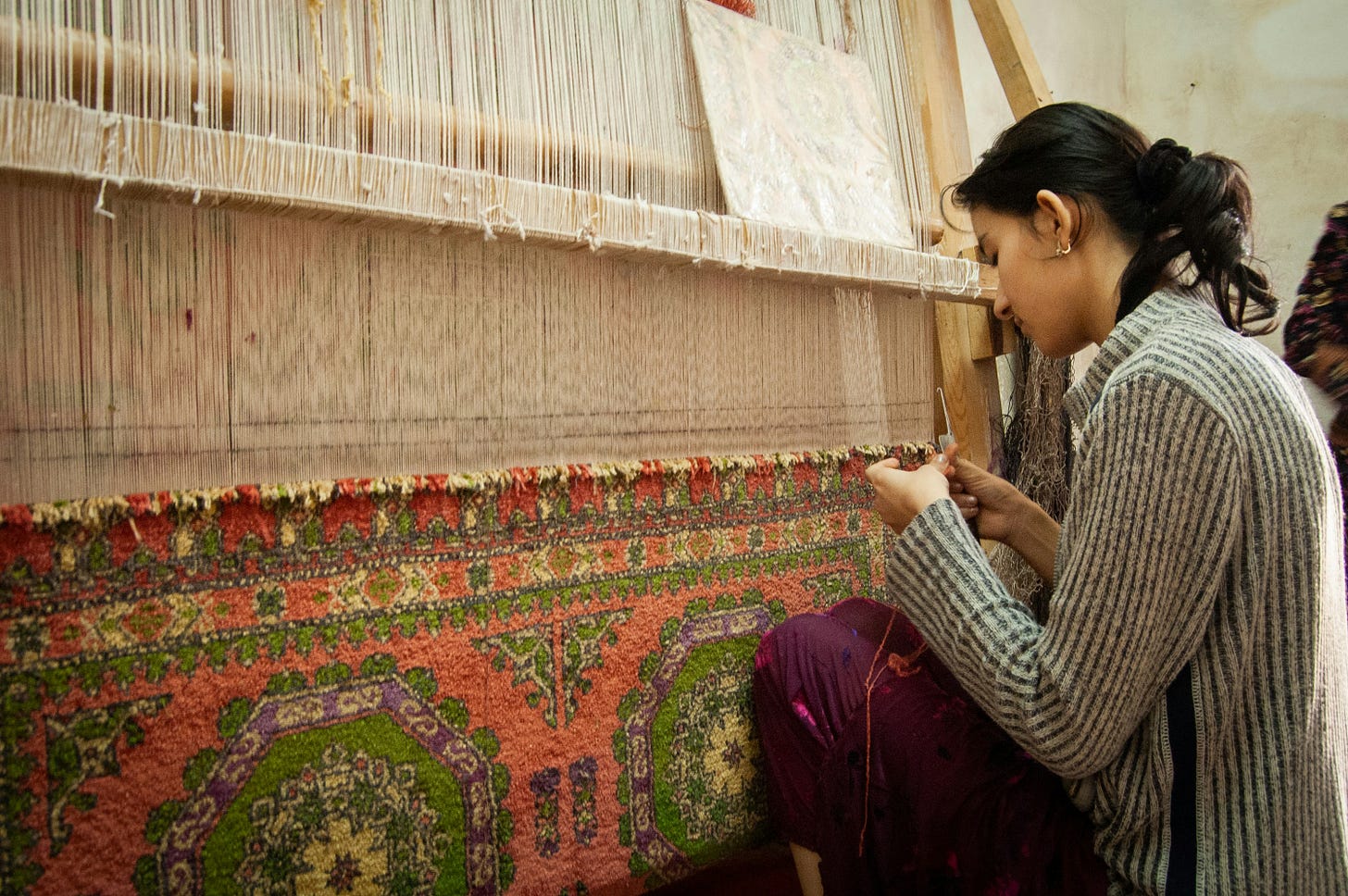I just started reading Feminism Against Progress by Mary Harrington. If you aren’t happy with the narratives you’ve heard about women and feminism, this would be a good book for you to read. I haven’t gotten very far, so I’ll save a full review for later. But I want to share a couple things that I’ve been learning lately, from her book and elsewhere as I learn more about the history of women, feminism, the women’s movement, etc.
Harrington reads the history of feminism as actually a response to industrialization. Consider this:
It’s normal for cultures to have gendered work. There is work that is women’s work and work that is men’s work. This was organized, not ideologically, but by the practicalities of life. Work that was conducive to keeping “half an eye on the children” (in Harrington’s words) was typically women’s work.
For thousands of years in nearly every culture, textiles have been women’s domain. I don’t know a lot about spinning and weaving but apparently it’s fairly easy to work with your tools at a height that toddlers can’t grab. You can interrupt it pretty easily if your kid starts hitting another kid or wanders near the pottery. You can bring your tools to someone’s home and do your work together. This sounds like the ideal kind of work to do with kids around. And let’s remember that pre-industrialization, this is how people obtained clothing, blankets, and so on. This is pre- factories, pre- huge machines, pre- Pottery Barn.

Enter industrialization. Now, textiles are made in big machines in factories, but human labor is still required. Since you can’t really have the big machines in your home, if you’re going to work in textiles, you have to leave home and go to a place with big dangerous machines, probably without your kids. So then you have to figure out what to do with your kids, and also you have to be away from your kids.
Harrington says that women (or society thinking about women) responded in basically two ways. One is often called the “cult of domesticity,” and it was the idea that women’s work in the home is still valuable even as a lot of the tasks have been gutted from the home. Women aren’t harvesting and canning and spinning and weaving and all of those things, but they’re nurturing and caring; they’re creating a home which is a haven or respite from the cruel world their husbands have to work in; they’re the primary agents in the development of their children’s morality (I guess because men are morally awful?) and a softening to men’s coarseness. The other is what we often call “feminism,” and it’s a push to make women (more or less) indistinguishable from men. If men are now autonomous economic agents, women should be, too. And then you run into problems like women giving birth on the factory floor because men don’t get accommodations for pregnancy or maternity leave so why should women?
Harrington argues that these two lines of thought ought to be seen primarily as responses to industrialization and women trying to grapple with their role in society now that they were (a) economically dependent on their husbands, contrasted with the interdependence that had marked home life, and (b) deprived of much of the productive economic work that they had been doing.
I think Harrington will argue — and anyway, I will argue — that as a society we haven’t finished grappling with this. We haven’t really figured out “women’s place.” Or, honestly, “men’s place.” The clear separation between work and family is not something people do normally; it’s a consequence of industrialization, and it’s hardest on women. The idea of an individual person as an autonomous economic unit is not normal in human history, and the autonomous ideal is hardest on women. Earlier I read Rights of Women by Erika Bachiochi (which I also recommend!), and she details a lot of the grappling with these issues.
A word on the title of Harrington’s book, Feminism Against Progress. She isn’t saying we should return to pre-industrial times or that industrialization is all bad. She’s saying that she isn’t convinced that humanity has actually progressed, or at least that if we want to make that case then we have to define “progress,” because there are costs to everything. The wealth that we have in the West is good… but much of it was built on colonialism, slavery, and other forms of exploitation. (People in my circles have different reactions to the word “colonialism.” We can argue about good and bad aspects, but the point here is that there were bad aspects.) The “progress” that women have made since, I don’t know, “back in the day,” is good but comes with a cost. So it’s not clear that it’s a net gain.
This is all very interesting and I’m really looking forward to reading more of the book.
What are some practices from pre-industrial times that you wish you had today? What have you read about in historical fiction that you kind of envied?
What are some things about modern life that have costs, even if you wouldn’t necessarily want to give them up?



Everything is more complex than it appears on the surface. While industrialization has increased wealth in the world, it has also increased dehumanization. Except on family farms perhaps, children are not valued as much as they used to be. They are considered more of a burden than an asset. This further erodes the value of the work of the mother in the home. I suspect that if there's a solution to this dilemma, it will start in the way people treat one another as individuals in their families and in their own circles, rather than in some government or business policy on taxes, childcare, or labor laws.